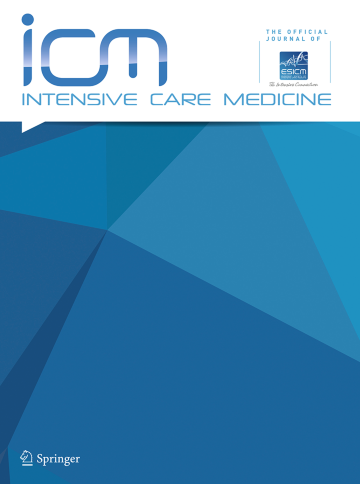Parmacogenetics in ICU patients: a short introduction
IF 21.2
1区 医学
Q1 CRITICAL CARE MEDICINE
引用次数: 0
Abstract
Pharmacogenetics (PGx) studies the effect of genetic variation on drug response to tailor drug treatment to the individual patient’s needs. The clinical application of pharmacogenetic testing was mostly limited to investigate cases of an unexplained toxic drug response. For example, we reported a case of azathioprine overexposure in a newborn who was identified as a homozygous TPMT*3C genotype, which results in accumulation of 6-TGN, the active metabolite of azathioprine [1].While the application of retrospective testing remains useful in specific cases, the ultimate aim of pharmacogenetic testing is to apply our understanding of how genetic variation affects drug response and toxicity pre-emptively, informing precision therapeutic choices. Together, the Clinical Pharmacogenetic Implementation Consortium (CPIC) and Dutch Pharmacogenetics Working Group (DPWG) have published evidence-based guidelines for more than 100 gene–drug pairs [2]. Interestingly, the frequency of actionable variants commonly occur on a population level and 90–95% of individuals across multiple populations carry at least one actionable variant [3]. Moreover, the drugs covered in the guidelines are commonly prescribed, including antidepressants, anticoagulants, pain medication and chemotherapy, with an estimated ~ 25% of the individuals carrying an actionable variant relevant to the drugs they are using [4].The clinical utility of a pre-emptive pharmacogenetic panel strategy was recently tested in the PREPARE-study [5]. PREPARE was a prospective study that enrolled 6944 patients who started treatment with one of the 39 drugs that had an actionable recommendation in the DPWG. The results showed that pre-emptive application of the 12-gene PGx panel test combined with DPWG recommendations resulted in 30% lower risk for clinically relevant (grade 2–5 CTCAE) adverse drug reactions in the first 12 weeks after treatment initiation. Together with other available evidence these data provide a robust evidence base for a broader clinical application of pre-emptive pharmacogenetic testing [6].PGx testing is most likely to be clinically relevant for drugs with a narrow therapeutic index, a consistent PK-PD relationship and where it is difficult to predict response (or adverse effects) and little time is available for trial-and-error. Therefore, in addition to clinical fields where PGx is already well accepted (e.g. oncology and psychiatry) the intensive care unit (ICU), with complex patients receiving multiple drugs concomitantly, will also benefit from PGx testing.ICU患者的药物遗传学:简要介绍
药物遗传学(PGx)研究遗传变异对药物反应的影响,以根据个体患者的需要定制药物治疗。药物遗传学检测的临床应用大多局限于调查不明原因的药物毒性反应的病例。例如,我们报道了一例硫唑嘌呤过度暴露的新生儿,该新生儿被鉴定为纯合子TPMT*3C基因型,导致硫唑嘌呤[1]的活性代谢物6-TGN的积累。虽然回顾性测试的应用在特定情况下仍然有用,但药物遗传学测试的最终目的是应用我们对遗传变异如何影响药物反应和毒性的理解,为精确的治疗选择提供信息。临床药物遗传学实施联盟(CPIC)和荷兰药物遗传学工作组(DPWG)共同发布了100多个基因-药物对的循证指南。有趣的是,可操作变异的频率通常发生在人群水平上,90-95%的个体在多个人群中携带至少一种可操作变异[3]。此外,指南中涵盖的药物通常是处方药,包括抗抑郁药、抗凝血剂、止痛药和化疗,估计约有25%的人携带与他们正在使用的药物相关的可操作变异[4]。先发制人的药物遗传学小组策略的临床效用最近在prep -study bbb中进行了测试。PREPARE是一项前瞻性研究,纳入了6944名患者,他们开始接受DPWG中具有可操作推荐的39种药物之一的治疗。结果显示,预先应用12基因PGx面板检测结合DPWG推荐,在治疗开始后的前12周内,临床相关(2-5级CTCAE)药物不良反应的风险降低了30%。与其他现有证据一起,这些数据为先发制人的药物遗传学检测的更广泛临床应用提供了强有力的证据基础。PGx检测最有可能与治疗指数较窄的药物、一致的PK-PD关系、难以预测反应(或不良反应)以及很少有时间进行试验和错误的药物具有临床相关性。因此,除了PGx已被广泛接受的临床领域(如肿瘤学和精神病学)外,重症监护病房(ICU),复杂患者同时接受多种药物治疗,也将受益于PGx测试。
本文章由计算机程序翻译,如有差异,请以英文原文为准。
求助全文
约1分钟内获得全文
求助全文
来源期刊

Intensive Care Medicine
医学-危重病医学
CiteScore
51.50
自引率
2.80%
发文量
326
审稿时长
1 months
期刊介绍:
Intensive Care Medicine is the premier publication platform fostering the communication and exchange of cutting-edge research and ideas within the field of intensive care medicine on a comprehensive scale. Catering to professionals involved in intensive medical care, including intensivists, medical specialists, nurses, and other healthcare professionals, ICM stands as the official journal of The European Society of Intensive Care Medicine. ICM is dedicated to advancing the understanding and practice of intensive care medicine among professionals in Europe and beyond. The journal provides a robust platform for disseminating current research findings and innovative ideas in intensive care medicine. Content published in Intensive Care Medicine encompasses a wide range, including review articles, original research papers, letters, reviews, debates, and more.
 求助内容:
求助内容: 应助结果提醒方式:
应助结果提醒方式:


